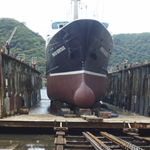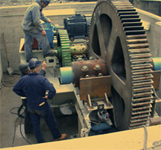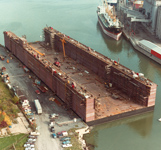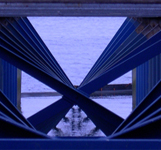Over 150 years of expertise in marine railways and floating dry docks
 |
 |
 |
 |
|
An
Introduction to Railway Dry Docks
and Transfer Systems
Part 1 - Five Generations of Crandalls
|
3. Side haul railway dry docks |
From 1854 to 1935, over 180 railway dry docks had been constructed in the United States, Canada and abroad by the first four generations of Crandalls. Since 1935, Crandall Dry Dock Engineers, Inc. has designed and installed with conspicuous success more than 75 railway dry docks both for private concerns and government agencies, at home and abroad. To those interested in the origin of the railway dry dock as distinguished from the English-type slipway, mention is appropriate of the innovations introduced in 1854 by William Hazard Crandall and his son, Horace J. Crandall, on an installation in East Boston. These included higher keel blocks and a deck over the cradle, which provided a working platform under the vessel for more efficient work at all stages of the tide. Previously men had worked from the ground, over and around the cradle beams, which were often submerged at high tide. Docking platforms, or "plank walks," were introduced, supported by uprights fastened to each side of the cradle; these platforms were above water when the cradle was lowered, so that men could walk along them while handling lines for warping and centering vessels and pulling the bilge blocks. Also, this railway dry dock at East Boston was probably the first such to use steam as motive power instead of men and horses, and it undoubtedly was the first one to have a pile foundation. This facility, which may be called the first railway dry dock, was still operating in 1950, having passed through several reconditionings in its 96 years of service. |
Progress...the result of never being satisfied
Crandall
Dry Dock Engineers, Inc.
Established 1854
(888) DRYDOCK crandalldd@aol.com
